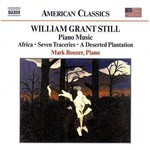
Still: Piano Music
 $25.00
Low Stock
add to cart
$25.00
Low Stock
add to cart
WILLIAM GRANT STILL
Still: Piano Music
Mark Boozer (piano)
[ Naxos American Classics / CD ]
Release Date: Monday 29 August 2005
Should this item be out of stock at the time of your order, we would expect to be able to supply it to you within 2 - 5 business days.
Long known as the doyen of Afro-American composers, William Grant Still was born on 11th May, 1895, in Woodville, Mississippi to musical and scholarly parents of African-American, Native American, Spanish, Irish, and Scotch heritage. Following the death of Still's father when William was only a few months old, the family moved to Little Rock, Arkansas, where the young Still began his musical education with violin lessons from a private teacher and a stack of Red Seal opera recordings bought for him by his stepfather.
Still attended Wilberforce University, spending his time there conducting the band and learning to play the various instruments in it, as he made his first attempts to compose and orchestrate. His subsequent studies at Oberlin Conservatory of Music were financed at first through his father's legacy, and later through a scholarship established just for him by the faculty. After graduating, he began his professional career playing in orchestras and orchestrating music, particularly for the violin, cello, and oboe. Some of the legendary musicians he worked with include Paul Whiteman, Artie Shaw, Bing Crosby, and Sophie Tucker, and for several years, he arranged and conducted the Deep River Hour on CBS and WOR radio.
Later study included a period at the New England Conservatory of Music and an individual scholarship with the ultra-modern composer Edgard Varèse. In the 1920s Still made his first appearances as a serious composer, receiving Guggenheim and Rosenwald Fellowships, and several important commissions including CBS, the 1939-1940 New York World's Fair, Paul Whiteman, the League of Composers, and the Cleveland Orchestra. Other honours included the jubilee Prize of the Cincinnati Symphony Orchestra (1944), the Freedoms Foundation Award (1953), and a prize from the U.S. Committee for the United Nations, the N.F.M.C., and the Aeolian Music Fund for his orchestral work The Peaceful Land, cited as the best musical composition honouring the United Nations (1961).
Tracks:
Three Visions
Seven Traceries
Lenox Avenue: The Blues
A Deserted Plantation
Africa (arr. for piano)